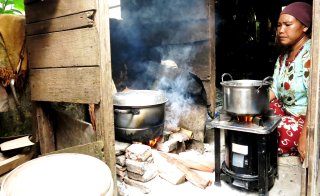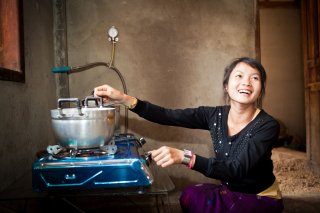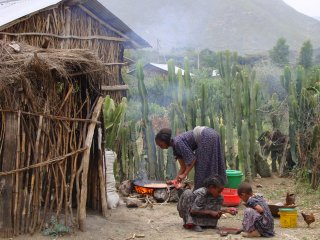Understanding the Issue: Household Energy and Clean Air
On this page:
On other pages:
Introduction
Household energy, which includes cooking, heating and lighting, plays a critical role in daily life. According to the World Health Organization, at least 2.3 billion people lack access to clean cooking technologies and rely on burning solid fuels like wood, charcoal, coal, dung, and crop residues in rudimentary stoves or three-stone fires. Burning solid fuels indoors releases dangerous particulate matter, carbon monoxide, and other toxic pollutants, leading to indoor air pollution levels that can be up to 20 times worse than the World Health Organization’s air quality guidelines. Indoor air pollution also contributes significantly to ambient (outdoor) air pollution, including toxic gases, particulate matter, and black carbon.
The air pollution created from burning solid fuels causes increased environmental health risks that disproportionately impacts women and girls, contributes to climate change and the degradation of local environments, and worsens poverty in low-income communities. The WHO estimates that exposure to emissions from solid fuels causes approximately 3.2 million premature deaths worldwide annually. Approximately 237,000 of these deaths are children under age five.

To address this challenge, the EPA works with other U.S. government agencies and partner organizations to increase the sustained use of cleaner home cooking technologies and fuels that are affordable, reliable, efficient, and safer. These efforts aim to reduce household energy pollutants to improve human health, reduce greenhouse gas emissions and the environmental impacts related to the demand for solid fuels like wood and charcoal. Reducing the climate and environmental impacts of cooking also improves equality between the sexes, economic opportunities, and quality of life.
Learn more:
Health
Exposure to household air pollution from burning fuels like wood, charcoal, coal, and kerosene is a leading risk factor for diseases, including childhood pneumonia, chronic obstructive pulmonary disease, acute respiratory infections, heart disease, stroke and lung cancer. According to WHO household air pollution statistics, household air pollution led to the loss of an estimated 86 million healthy life years in 2019. Emerging evidence shows that when pregnant women are exposed to these pollutants, their infants are at increased risk for stillbirth, low birth weight and decreased lung function.

Health outcomes can be improved when polluting open fires and inefficient biomass stoves are replaced with demonstrably improved biomass stoves and stoves that use cleaner burning fuels, such as biogas, electricity, ethanol, liquefied petroleum gas (LPG) and natural gas. In the long term, increasing the use of cleaner, more modern stoves and fuels reduces harmful emissions and personal exposure to household air pollutants.
Pollution from household energy use contributes around 20% of ambient air pollution globally, and often more than 50% of ambient air pollution locally, depending on the geographic area and the season. These emissions have far-reaching effects, especially in low-to-middle income countries. When combined, ambient air pollution and household air pollution contribute to 6.7 million premature deaths annually.
The EPA’s Megacities Partnership provides national and local policy makers with a framework to develop and implement comprehensive action plans to address air quality and improve public health in cities. Cities’ Air Quality Management Plans can include addressing the contribution of household energy to ambient air pollution which improves public health and environmental quality.
Air Pollution
In addition to significant health improvements, climate equity is a powerful motivation to improve household cooking and heating practices. According to WHO statistics (PDF), greenhouse gas emissions from non-renewable fuels for cooking amount to an estimated 1.3 gigatons (1.3 billion metric tons) of carbon dioxide per year. This represents about 2% of all global carbon dioxide emissions, about the same amount of all global CO2 emissions from aviation or shipping. Each biomass stove emits an estimated 2-6 tons of CO2 annually. Because improved biomass stoves can reduce emissions by 50-80%, and clean-fuel stoves more than 95%, many clean cooking programs are eligible to receive carbon credits.
Household energy emissions are the largest controllable source of the short-lived climate pollutant, black carbon. Globally, cooking with solid fuels is responsible for up to 25% of total controllable black carbon emissions, this can be as high as 60-80% in some African and Asian countries. Black carbon has a per-unit climate warming capacity hundreds to thousands of times greater than carbon dioxide, making it one of the largest contributors to climate change. It is especially important to reduce black carbon emissions in mountainous regions, like the Andes and Himalayas, because the dark deposits on snow absorb the rays from the sun, accelerating glacial melting and contributing to sea level rise and more extreme weather events, like typhoons. This can also impact rainfall and the local climate. Reducing emissions of short-lived climate pollutants, like black carbon, has immediate climate benefits, while reducing emissions of long-lived pollutants, like CO2, has climate benefits farther in the future.
The U.S. Agency for International Development’s Clean Air Catalyst flagship program is a partnership between government and nongovernmental organizations to combat air pollution and its climate and public health impacts. Clean Air Catalyst recognizes that household energy use is an important contributor to air pollution and works with communities to build capacity for locally tailored solutions to curb pollution from household energy use and other sources.
Environment
In addition to household energy’s climate impact, wood collection for cooking and heating contributes to forest degradation and land use changes, including the loss of wildlife habitat. Up to 34% of wood fuel is harvested unsustainably, and over 275 million people live in “hotspots” where over 50% of wood fuel harvesting is unsustainable. Because population and demand for wood fuels are increasing in many regions, forests often do not have the capacity to regenerate quickly enough to replace what is being harvested. People living in these areas often already face other environmental and social challenges that put them at higher risk of the impacts of climate change.
For more information about cooking’s environmental impacts, see the Clean Cooking Alliance’s report: Accelerating clean cooking as a nature-based climate solution (pdf) (8.7 MB).
Sex

Household energy pollution disproportionately impacts women and girls because they are most often responsible for cooking and fuel collection. The time women and girls spend collecting fuel affects their ability to attend school and pursue other economic and leisure activities. Transitioning to more efficient and cleaner stoves reduces time spent collecting fuel and cooking and enables women to spend more time with their children, tend to other responsibilities, pursue income-generating or educational opportunities, and enjoy leisure activities and rest—all of which contribute to poverty alleviation.
